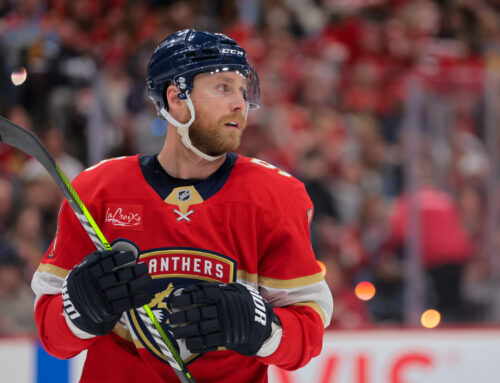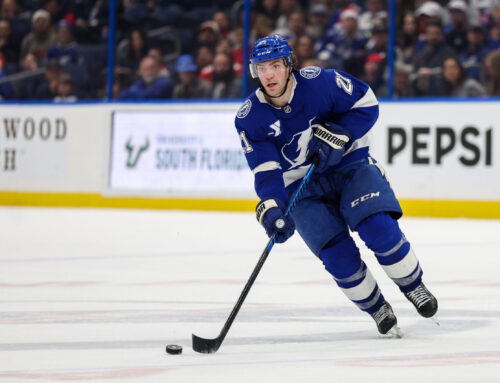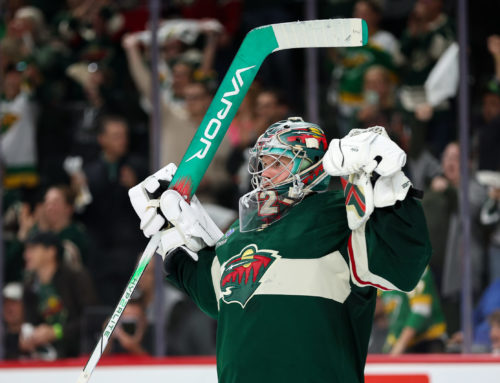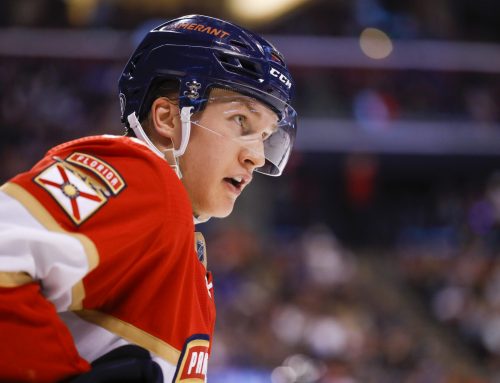
Who is the better fantasy hockey own – Mike Richards or Joe Pavelski?
Facing off this week are two mid-career Western Conference centers – Mike Richards and Joe Pavelski. Which one should you choose over the other for your fantasy team? Time to find out, in Cage Match!
Career Path and Contract Status
Pavelski is already 29 and has played in nearly 500 career games. He was not an elite prospect when drafted (203rdoverall in 2003) but played so well in college hockey and during a brief AHL stint that he landed in the NHL to stay in 2007 and had a 59 point season by 2008-09. Since then, he posted point totals in the 50s, then the 60s in his last two full seasons, before finishing 2012-13 at a 53 point pace.
There's always been debate as to what Pavelski's points ceiling might be, since during all his time in San Jose Joe Thornton has been firmly entrenched as the team's #1 center while Pavelski has bounced between various lines and even played some wing. This might all change next season, as Thornton is on the last year of his deal, while Pavelski will start on year one of a five year deal paying $6M per season.
Richards is nearly a full year younger than Pavelski yet has played in nearly 100 more NHL games, due in large part to jumping straight from the OHL to the NHL as a 20 year old former first round pick. Richards' career has been more of a roller coaster ride, having gone from 155 points in 152 games with the Flyers in 2007-08 and 2008-09 to a mere 44 points in 74 games in his first full season with the Kings in 2011-12. But Richards rebounded last season, not just by scoring 32 points in 48 games (a 55 point full season pace) but also by posting 11 points in 11 games near the end of the regular season and carrying that momentum into 12 points in 15 playoff games.
Like Pavelski, Richards is a highly talented center, but in his case Anze Kopitar is the roadblock instead of Joe Thornton, although unlike Thornton Kopitar is signed through 2016. As for Richards' contract status, he's about half-way through a 12 year, $69M deal, with his highest salary under the deal being this past season and the amount per year dropping most every year by at least $500,000 between now and when it expires.
Place in Top Six
Richards looks to be a lock for the LA top six, not just because of his large contract, veteran status and past output, but also because as of now there are no up and coming centers in the Kings system that would be in position to actually displace Richards within the next few seasons.
With Pavelski, one could argue that he already fell outside of the top six last season, since according to Frozen Pool he spent more time centering the likes of Tommy Wingels and Raffi Torres or James Sheppard and T.J. Gallardi than he did lining up (as a winger) with Thornton and Patrick Marleau. But he did also see time at his natural position of center with Marleau, although for what it's worth that also happened to coincide with part of Marleau's brutal 17 points in 41 games slump.
Early indications suggest more of the same this season for Pavelski, with him having spent most of the preseason with Wingels and Matthew Nieto. Plus, between the outstanding preseason from 2012 first rounder Tomas Hertl and the increasing likelihood that the Brent Burns as a forward situation will continue, Pavelski could have an even more difficult time landing in the top six during 2013-14.
But the magic question is whether (and, if so, to what extent) all this actually matters, given the Ice Time each player actually receives. Let's tackle that next.
Ice Time
These numbers should provide key data. We'll be able to see if Richards' improved output last season (versus 2011-12) was tied to more Ice Time, plus whether Pavelski still enjoyed a lot of Ice Time last season (especially PP time) despite occupying somewhat of a third line role.
|
Season |
Total Ice Time |
Rank among team's forwards |
PP Ice Time |
Rank among team's forwards |
SH Ice Time |
|
2012-13 |
18:54 (Pavelski) 16:21 (Richards) |
2nd (Pavelski) 6th (Richards) |
3:00 (Pavelski) 2:37 (Richards) |
4th (Pavelski) 4th (Richards) |
1:33 (Pavelski) 1:17 (Richards) |
|
2011-12 |
20:36 (Pavelski) 18:53 (Richards) |
1st (Pavelski) 3rd (Richards) |
3:12 (Pavelski) 3:06 (Richards) |
2nd (Pavelski) 3rd (Richards) |
1:34 (Pavelski) 2:02 (Richards) |
|
2010-11 |
19:39 (Pavelski) 18:52 (Richards) |
3rd (Pavelski) 2nd (Richards) |
3:21 (Pavelski) 2:56 (Richards) |
2nd (Pavelski) 3rd-t (Richards) |
1:57 (Pavelski) 2:08 (Richards) |
The number that jumps out immediately is Richards only managing to receive the sixth most Ice Time among Kings forwards in 2012-13, yet still seeing his point scoring pace improve considerably compared to the 2011-12 season (when he received 2:30 more in Ice Time and 30 seconds more PP Ice Time per game). The explanation for this comes in the form of the arrival in LA last season of Jeff Carter, Richards' linemate from back in his Flyers days. Those two played together for well over 80% of Richards' EV and PP shifts last season and started to rekindle their old magic, which should continue this season and beyond since Carter is signed past the 2018-19 end date for Richards' contract.
There seems to be little risk of either player not receiving prime PP minutes this coming season, as although neither one ranked as a top three forward on their teams last season in PP Ice Time, they also barely trailed the overall leader (Richards trailed Dustin Brown by a mere 12 seconds, and Pavelski trailed Thornton by a mere 17 seconds). Interestingly, SH Ice Time flip flopped last season, with Richards going from 2:02 in 2011-12 to 1:17 in 2012-13, while Pavelski remained essentially constant at 1:33. The SH Ice Time trend is a good sign for Richards owners, and not especially worrisome for Pavelski.
But Pavelski's overall Ice Time numbers do not bode well for the upcoming season, and perhaps even down the road. Seeing how much Ice Time Pavelski received in 2010-11 and 2011-12, one would've expected him to have put up numbers more comparable to his teammates who received similar or even less Ice Time. Plus, even though last season Pavelski spent time with less talented linemates than in the past, and saw his overall Ice Time plunge by about 90 seconds and his PP Ice Time slip as well, that still doesn't explain the big drop in his point scoring pace to 53, especially when he managed to score 66 points in 74 games in 2010-11 with only about 30 seconds more Ice Time per game versus last season.
This certainly raises concerns for this season, but also the future. Pavelski is signed to such a large contract that he must factor prominently into the Sharks' plans; but that's not the issue – the concern lies in the fact that his production was so poor last season when he wasn't paired with Thornton or Marleau, since one or both of those guys likely will be gone after this campaign. Then what?
Relative Value of Points
For those who might have missed my explanation of this concept in my recent columns, the gist of "relative value of points" is that points are more valuable for a fantasy team when they're not shared by other players owned in your league, since those are the kinds of points that can cause actual movement in the standings. If there's one benefit of Pavelski being relegated to at least a part time third line role it's that his points would hold more value than is he was lined up with highly owned players like Thornton, Marleau, or Logan Couture. For Richards, most every point he receives will also be shared by Carter, who likely is widely owned in all leagues, particularly ones that favor goals and shots, or Yahoo leagues in general due to Carter's eligibility at all three forward positions. Edge to Pavelski here.
Secondary Categories
Make no mistake – you're not drafting either of these guys in hopes they'll somehow morph into the next multi-cat stud like Dustin Brown, David Backes or Ryan Callahan. But it's still worth examining their stats in these various areas, to see how they stack up against each other and if there are any positive or negative trends.
|
Season |
Plus/Minus |
PP Points |
Hits |
Blocked Shots |
PIMs |
Shots |
|
2012-13 |
+2 (Pavelski) -8 (Richards) |
11 (Pavelski) 15 (Richards) |
48 (Pavelski) 58 (Richards) |
44 (Pavelski) 19 (Richards) |
10 (Pavelski) 42 (Richards) |
130 (Pavelski) 82 (Richards) |
|
2011-12 |
+18 (Pavelski) +3 (Richards) |
18 (Pavelski) 14 (Richards) |
50 (Pavelski) 115 (Richards) |
84 (Pavelski) 39 (Richards) |
31 (Pavelski) 71 (Richards) |
269 (Pavelski) 171 (Richards) |
|
2010-11 |
+10 (Pavelski) +11 (Richards) |
28 (Pavelski) 21 (Richards) |
61 (Pavelski) 104 (Richards) |
67 (Pavelski) 73 (Richards) |
24 (Pavelski) 62 (Richards) |
282 (Pavelski) 184 (Richards) |
Shots and PIM have been pretty consistent for each player, with Richards dominating Pavelski in PIM and Pavelski clearly outshining Richards in Shots every year. Richards has seen his plus/minus go straight downhill, and you have to wonder if he's finally bottomed out or if it could get worse before it gets better, while Pavelski's plus/minus number has fluctuated (most likely based on the team's success). Hits and Blocked Shots are interesting, as Richards' advantage in Hits all but vanished last season while Pavelski's roughly two to one edge in Blocked Shots seems to be holding steady.
The PP points data is somewhat eye opening in that, although Pavelski's numbers the past two seasons haven't been too bad in the grand scheme of things, it is troubling that he only finished fourth among Sharks forwards in 2011-12 despite receiving the second most PP Ice Time. Based on this, and his again finishing fourth last season, I wouldn't look for his PP points pace to bounce back any time soon. For Richards, the news was a lot better, as last season he finished with the second most PP points among LA forwards despite receiving only the fourth highest per game PP Ice Time. What's more, his 15 PP points in 48 games was more than the 14 he collected in 74 contests during 2011-12. Look for him to easily cruise to 20+ PP points this season.
Overall no player clearly dominates the secondary categories landscape, and the main "beneath the surface" trend might be Richards' PP points trending upward.
Value vs. Cost
As of when I'm writing this, Pavelski was 90% owned in Yahoo leagues, while Richards was owned in even more – 98%. That surprised me, as I thought they'd be closer notwithstanding Pavelski's decline in stats last season and Richards' rebound. Despite this, I think in some leagues Pavelski might have a bit more value due to people still thinking back to him outscoring Richards by 17 points in their last full season (2011-12), plus the now largely incorrect perception that LA is a defense first team and San Jose is an offensive juggernaut. In truth, the Kings finished ninth last season both in goals scored and goals allowed, while San Jose was 7th in goals against but way down in 23rd in goals scored.
So Who Wins?
I'm taking Richards over Pavelski in nearly every one year league format, as I just don't see any way Pavelski outperforms Richards this season.
Of course the magic question is what to do about Pavelski in keeper leagues, due the likelihood that Thornton and/or Marleau will be gone from San Jose after this campaign, necessarily freeing more top six minutes for him. What we do know for sure is the Sharks will play Pavelski a lot – they have no choice due to his large contract. But I think last season was very telling, since Pavelski would likely find himself skating with the same types of "notch below" players next season that he is now and was in 2012-13, in which case he's poised to remain a 50-60 point player. So be sure to draft him accordingly; either that or trade him soon to someone who values him too highly, or who will net you a player in return that has 50-60 downside while more of a chance at 70+ in the near future.
Recent Cage Matches:
| Tomas Plekanec vs. Cody Hodgson | |||
| David Clarkson vs. Viktor Stalberg | |||
| Sam Gagner vs. Teddy Purcell |





 EDM
EDM TOR
TOR PIT
PIT VAN
VAN FLA
FLA MIN
MIN DET
DET COL
COL ARI
ARI
